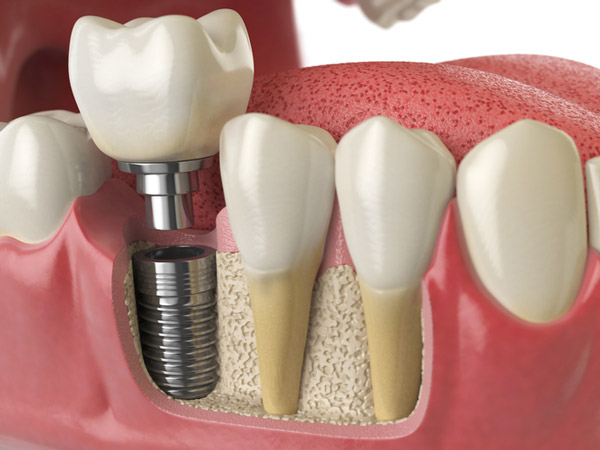Dental Implant Maintenance: How to floss Dental implants are unique for tooth replacement. All dental implants anchor into your jawbone via a titanium dental screw. The jawbone and gums act to give the implant support, and because the implant is attached to your jawbone, your body believes it is real. You now have a tooth, or a set of teeth, that will help your jaw keep its shape and may allow your other teeth a better chance at survival. Dental implants are unique for tooth replacement. All dental implants anchor into your jawbone via a titanium dental screw. The jawbone and gums act to give the implant support, and because the implant is attached to your jawbone, your body believes it is real. You now have a tooth, or a set of teeth, that will help your jaw keep its shape and may allow your other teeth a better chance at survival. Maintaining Oral HygieneWhile dental implants are a crucial leap forward, you must practice good oral hygiene skills to ensure you do not have problems with your implant. While everyone knows that brushing your teeth is important, it is equally as important with dental implants. Another important step in keeping up with good oral hygiene is daily flossing. FlossingDepending on the types of dental procedures you had for your dental implant, you may need to change your flossing routine a bit to achieve optimum dental health. Flossing is a critical part of dental care for your implants and your natural teeth. It is important to floss in between your natural teeth and your implants twice daily. However, you need to take special care with your implanted teeth. If you have a single implanted tooth, you need to make sure that you floss underneath the implant. The screw that anchors your implant to your jawbone is narrow, which means there will be a small space between the bottom of the implant and the top of the gum. You need to floss underneath the implant to ensure there are no trapped food particles there. If you have a multiple-tooth implant, you need to floss all of the space underneath it. If you have a total tooth replacement, you also need to floss under your entire implanted full arch. Many of our patients who have dental implants opt to use a water flosser to keep their teeth and gums healthy. Water flossers take the place of string floss; they use a jet of water rather than a string. They are also easy for patients to use. It does not matter which type of flosser you choose as long as you floss daily. Foods to AvoidAlthough you can eat nearly every food imaginable now that you have a dental implant, some foods you need to avoid or eat differently. You need to stay away from overly sticky foods such as caramel or gum once you have dental implants. Not only do they leave a sticky residue on your teeth and implants, but they also cause bacterial growth and can damage your implant. You also need to avoid cracking ice with your implanted teeth and do not use your teeth as a tool to open packages. We have seen far too many implants break because someone was trying to open a can or bottle with their teeth. If you are eating hard or crunchy foods, you need to cut them into smaller pieces to chew and digest so you do not damage your implant. Contact Us for More Tips!To learn more about how to properly maintain your dental implants, contact us at Durham Prosthodontics by calling (919) 489-8661. We'd be happy to schedule an appointment where we can review the best oral hygiene practices for your new implant. |

Contact Information3709 University Dr Suite D Durham, NC 27707-6224 (919) 489-8661 info@mydurhamdentist.com Follow Us |